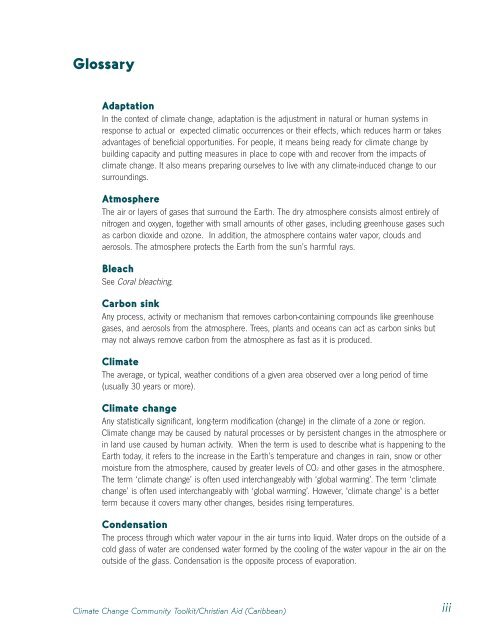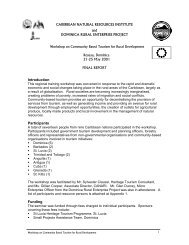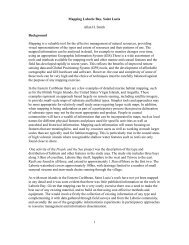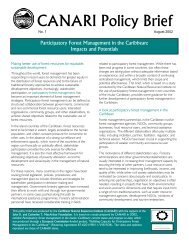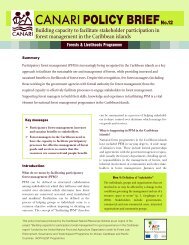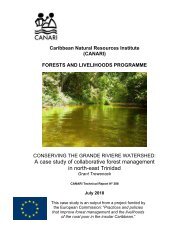Addressing Climate Change in the Caribbean: A Toolkit ... - CANARI
Addressing Climate Change in the Caribbean: A Toolkit ... - CANARI
Addressing Climate Change in the Caribbean: A Toolkit ... - CANARI
Create successful ePaper yourself
Turn your PDF publications into a flip-book with our unique Google optimized e-Paper software.
Glossary<br />
Adaptation<br />
In <strong>the</strong> context of climate change, adaptation is <strong>the</strong> adjustment <strong>in</strong> natural or human systems <strong>in</strong><br />
response to actual or expected climatic occurrences or <strong>the</strong>ir effects, which reduces harm or takes<br />
advantages of beneficial opportunities. For people, it means be<strong>in</strong>g ready for climate change by<br />
build<strong>in</strong>g capacity and putt<strong>in</strong>g measures <strong>in</strong> place to cope with and recover from <strong>the</strong> impacts of<br />
climate change. It also means prepar<strong>in</strong>g ourselves to live with any climate-<strong>in</strong>duced change to our<br />
surround<strong>in</strong>gs.<br />
Atmosphere<br />
The air or layers of gases that surround <strong>the</strong> Earth. The dry atmosphere consists almost entirely of<br />
nitrogen and oxygen, toge<strong>the</strong>r with small amounts of o<strong>the</strong>r gases, <strong>in</strong>clud<strong>in</strong>g greenhouse gases such<br />
as carbon dioxide and ozone. In addition, <strong>the</strong> atmosphere conta<strong>in</strong>s water vapor, clouds and<br />
aerosols. The atmosphere protects <strong>the</strong> Earth from <strong>the</strong> sun’s harmful rays.<br />
Bleach<br />
See Coral bleach<strong>in</strong>g.<br />
Carbon s<strong>in</strong>k<br />
Any process, activity or mechanism that removes carbon-conta<strong>in</strong><strong>in</strong>g compounds like greenhouse<br />
gases, and aerosols from <strong>the</strong> atmosphere. Trees, plants and oceans can act as carbon s<strong>in</strong>ks but<br />
may not always remove carbon from <strong>the</strong> atmosphere as fast as it is produced.<br />
<strong>Climate</strong><br />
The average, or typical, wea<strong>the</strong>r conditions of a given area observed over a long period of time<br />
(usually 30 years or more).<br />
<strong>Climate</strong> change<br />
Any statistically significant, long-term modification (change) <strong>in</strong> <strong>the</strong> climate of a zone or region.<br />
<strong>Climate</strong> change may be caused by natural processes or by persistent changes <strong>in</strong> <strong>the</strong> atmosphere or<br />
<strong>in</strong> land use caused by human activity. When <strong>the</strong> term is used to describe what is happen<strong>in</strong>g to <strong>the</strong><br />
Earth today, it refers to <strong>the</strong> <strong>in</strong>crease <strong>in</strong> <strong>the</strong> Earth’s temperature and changes <strong>in</strong> ra<strong>in</strong>, snow or o<strong>the</strong>r<br />
moisture from <strong>the</strong> atmosphere, caused by greater levels of CO2 and o<strong>the</strong>r gases <strong>in</strong> <strong>the</strong> atmosphere.<br />
The term ‘climate change’ is often used <strong>in</strong>terchangeably with ‘global warm<strong>in</strong>g’. The term ‘climate<br />
change’ is often used <strong>in</strong>terchangeably with ‘global warm<strong>in</strong>g’. However, 'climate change' is a better<br />
term because it covers many o<strong>the</strong>r changes, besides ris<strong>in</strong>g temperatures.<br />
Condensation<br />
The process through which water vapour <strong>in</strong> <strong>the</strong> air turns <strong>in</strong>to liquid. Water drops on <strong>the</strong> outside of a<br />
cold glass of water are condensed water formed by <strong>the</strong> cool<strong>in</strong>g of <strong>the</strong> water vapour <strong>in</strong> <strong>the</strong> air on <strong>the</strong><br />
outside of <strong>the</strong> glass. Condensation is <strong>the</strong> opposite process of evaporation.<br />
<strong>Climate</strong> <strong>Change</strong> Community <strong>Toolkit</strong>/Christian Aid (<strong>Caribbean</strong>)<br />
iii


